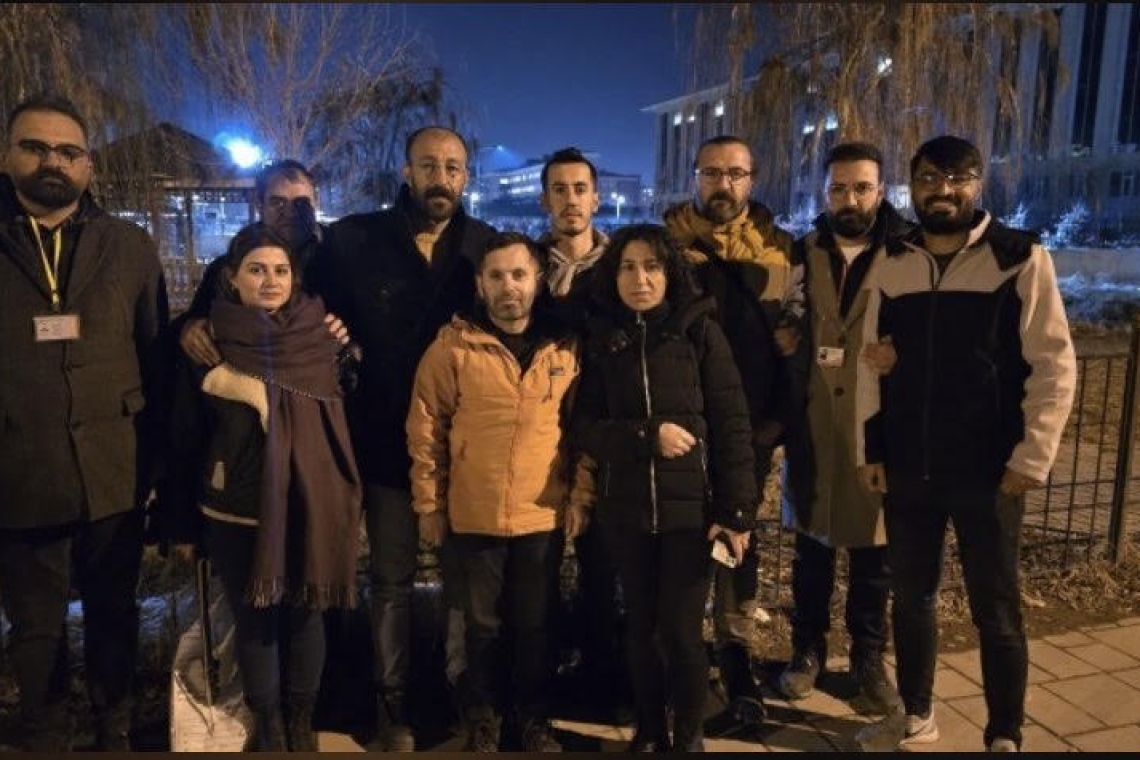Deniz Tekin
Journalists detained while covering protests against the appointment of a trustee to Van Metropolitan Municipality said they were taken into custody with their hands cuffed behind their backs, despite identifying themselves as members of the press. Journalist Mehmet Güleş reported that a police officer kicked him in the stomach, while Medine Mamedoğlu claimed their detention was aimed at preventing news coverage of rights violations. Ruşen Takva emphasized the illegality of detaining journalists as if they were protesters.
Following the protests triggered by the appointment of a government trustee to replace the elected mayor of Van, police detained JİNNEWS reporter Rabia Önver, Mezopotamya Agency reporters Bilal Babat and Mehmet Güleş, as well as journalists Behçet Bayhan, Ruşen Takva, and Medine Mamedoğlu on Feb. 15.
Takva, Güleş, Önver, and Mamedoğlu were released later that day after police questioning, while Bayhan and Babat were referred to court with a request for their arrest. A judge ordered their release under judicial control two days later. Meanwhile, 20 protesters were arrested on Feb. 17 on charges of violating Turkey’s law on public assemblies and demonstrations.
‘We showed our press cards, but they cuffed our hands behind our backs’
Mamedoğlu, who was previously detained while covering an April 3, 2024 protest in Van over the annulment of opposition politician Abdullah Zeydan’s mayoral certificate of election, described how police used tear gas, pressurized water, and rubber bullets on demonstrators without warning. She also said officers chanted nationalist slogans such as “You will see the power of the Turk” and physically assaulted protesters.
According to Mamedoğlu, a police officer asked his colleagues, “Are we detaining the press too?” before arresting her along with fellow journalists Rabia Önver, Behçet Bayhan, and Bilal Babat. “We showed our press cards and explained that we were there to report the news, but they still took us into custody, handcuffing us from behind. The plastic cuffs were so tight that our arms were in severe pain. My colleague Rabia Önver was unable to obtain a medical report on her injuries because her cuffs were not removed. They confiscated our phones and cameras at the police station,” she said.
She argued that their detention was an attempt to suppress reports on rights violations: “We know very well that the main reason we were detained was to prevent news coverage of the police brutality and rights violations that occurred. We were subjected to insults in the police vehicle and were denied water for hours despite repeatedly asking for it.” She added that she would pursue legal action against the officers involved.
‘A police officer kicked me in the stomach as I showed my press card’
Journalist Mehmet Güleş stated that police had specifically targeted reporters at the protest: “They had identified the journalists in advance, as they were carrying our photos. From the very beginning, they intervened against us. Their goal was to prevent us from documenting and exposing police violence. Despite identifying ourselves as journalists, we were subjected to severe physical violence. A police officer kicked me in the stomach as I showed my press card. They dragged me away and handcuffed my hands behind my back. Then, they forced me face-down on the ground and stepped on me.”
Güleş said he suffered swelling and bruising due to the tight handcuffs but was kept restrained for nearly five hours despite his complaints. “I saw many people with broken noses and other injuries caused by police violence,” he added.
Emphasizing the importance of press freedom, Güleş said, “In a country where democracy and the rule of law prevail, press freedom cannot be restricted. But in Turkey, independent and opposition journalists—who make up just 5% of the media—are under intense pressure.” He also criticized the charges against them, noting, “We are accused of ‘resisting to prevent law enforcement from performing their duty,’ but it was the police who prevented us from doing our job.”
‘Disinformation law threatens press freedom’
Ruşen Takva, who was detained under Turkey’s controversial “disinformation law” for sharing video footage of the police raid on Van Metropolitan Municipality, warned that the law was being used to suppress journalism: “This law has gone beyond censorship and repression—it now threatens the very existence of free journalism.”
He recounted how he was taken into custody less than 34 minutes after posting the footage: “From the moment the police raided the municipality, we documented the detentions and the events as they unfolded. Despite this, I was accused of ‘publicly disseminating misleading information’—a charge that is absurd, given that everything was recorded. Over my career, I have published countless news reports, and no institution or individual has ever proven them false.”
Takva also pointed out that their detention prevented them from covering the day's events: “The goal was clear—to stop us from reporting on protests and public reactions to the trustee appointment.”
‘Even journalists are being treated as protesters and punished’
Takva criticized the use of protest-related charges against journalists, stating, “Journalists do not attend protests as demonstrators. We are there to report the facts, to fulfill our duty to the public, and to uphold the right to information. Yet, two of our colleagues were placed under judicial control for allegedly violating the public assembly law.”
He concluded by reaffirming his commitment to journalism despite the challenges: “We will continue to report the truth and inform the public. But beyond journalism, we must also organize and resist these pressures collectively.”



